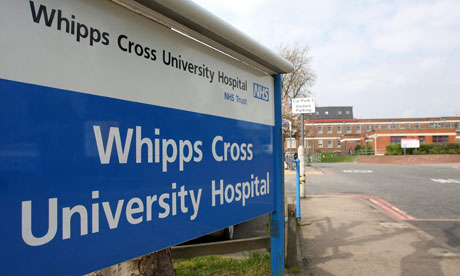
NHS inspectors have uncovered "a catalogue of failings" at a London hospital including uncaring staff, blood-stained equipment, poor hygiene standards, patients not being helped to eat and a high mortality rate.
The Care Quality Commission (CQC), the NHS care watchdog, has castigated Barts Health NHS Trust for the "very serious concerns" its inspectors found when they staged two unannounced inspections in several key departments at Whipps Cross University hospital in east London in May and June.
During the visits a midwife was seen being sarcastic and unsympathetic to a new mother in a blood-stained gown who complained of being in pain. The midwife brought her tablets but did not explain what they were. She then also brought the woman the wrong sort of formula milk for her baby, did not accept that she had done so and did not then offer to bring her the right one.
"We found that, in places, the hospital was unsafe and dirty, and that staff didn't always show patients the compassion that people deserve," said Matthew Trainer, the CQC's regional director for London. "Patients were not receiving the care and support they should have been able to expect, and in some cases this was putting them at risk of harm. If staff have uncaring attitudes, are not supported properly to do their job, or if they are not properly supervised, the consequences for patients can be very worrying," he said.
In an unusually critical assessment, inspectors said the hospital was in breach of 10 of the 16 national standards for quality and safety of care. Some failings were so grave that patients' safety was in danger.
Barts Health, which is the biggest NHS trust and runs five other hospitals, has been issued with three formal warnings to improve Whips Cross's performance - on cleanliness and infection control; safety, availability and suitability of equipment; and support to staff. The CQC has demanded urgent action in these areas.
"We saw examples of poor care, unacceptable staff behaviour and poor infection control in maternity services. In surgery, theatre processes and communication arrangements put people's safety at risk. Surgery and maternity were both too busy, did not have enough staff to look after people's needs, and lacked bed capacity, which meant they were not as effective as they should be and not always responsive to people's needs," one of the CQC's two reports into the hospital said. Management had not done enough to tackle these problems, it added.
In the maternity unit, staff on the postnatal ward were found to be uncaring, while in the labour ward inspectors found blood stains on a stainless steel bowl in a room that staff said was ready to use. In another there were also stains on the disposable curtains.
Care was "not always delivered safely" and some newborns ended up in intensive care "related to a failure by midwives to carry out the correct observations at the right time and escalating mothers [for treatment] when required", the CQC said. A lack of maternity beds meant the unit occasionally had to shut temporarily, with women who expected to give birth there being sent instead to other hospitals when they were already in labour.
In surgical services, a lack of staff on two wards inspected "led to people receiving unacceptable levels of care", while a bed shortage "meant that people waited too long in the recovery areas after surgery" and operations were often cancelled. In addition, "people were having poor outcomes after surgery as the 90-day post-surgery mortality rate was higher than the national average".
The A&E unit had not met the key NHS target of treating 95% of patients within four hours for six months before the inspection and patients arriving in ambulances sometimes ended up receiving medical attention while still on a trolley.
In the elderly care department, some wards had to share equipment and inspectors saw that some patients had to wait to be helped to eat their meal or received no help at all, while water was sometimes put out of their reach. Five patients had developed pressure sores after admission, while checks on feeding tubes were not done.
Peter Morris, Barts Health's chief executive, said it was "extremely sorry for the failings" the CQC had found.
He said it had already introduced "robust action plans", including improvement in training and care standards for maternity staff, bringing in personnel from its other hospitals and ensuring that the 500 staff who look after elderly patients always provided excellent care.
The Department of Health said: "It is unacceptable that Whipps Cross hospital is failing to meet fundamental care standards. It is right that the regulator has exposed these problems, and that this hospital takes urgent steps to improve."
Harga Laptop
0 comments Blogger 0 Facebook
Post a Comment